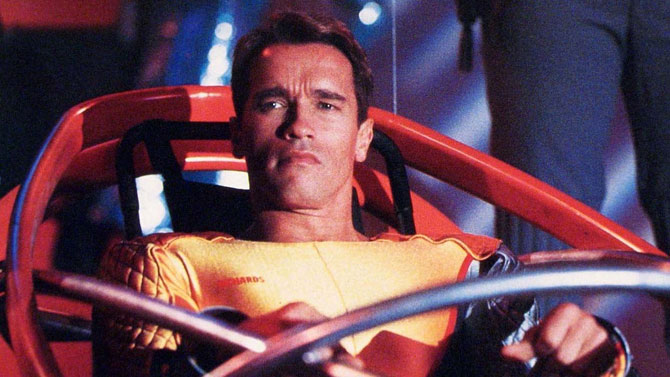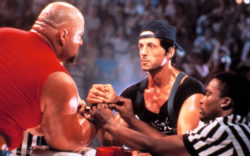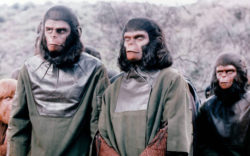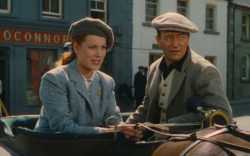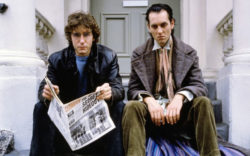With the recent success of It, many moviegoers may have a renewed interest in the rich catalog of cinematic adaptations of the work of horror novelist Stephen King. Since Brian De Palma’s teen-horror milestone Carrie in 1976, fans of King’s novels have had over 60 opportunities to see his work on the big screen.
Athens cinephiles will have an opportunity to commemorate the 30th anniversary of one of these adaptations, 1987’s The Running Man, at Flicker Theatre & Bar on Monday, Nov. 20 (see The Calendar for details). The screening will be an installment of the bar’s ongoing Flicker Dinner Theater series, featuring Austrian and German foods (including soft pretzels, beer cheese, spätzle and more) from High Life Pop-Ups.
After enjoying Arnold Schwarzenegger’s contributions to King’s story, curl up with another King adaptation enhanced with its adaptor’s signature touches: Toronto director David Cronenberg’s The Dead Zone.
Go Out and Watch
THE RUNNING MAN (1987) In the far-off (at the time) year of 2017, totalitarianism has replaced the rule of law in the U.S. Citizens are pacified by television, and the most popular program is “The Running Man,” a game show pitting former convicts called “runners” against “stalkers,” heavily armed killers with gimmicks that would be at home in pro wrestling. Two years after Neil Postman’s seminal exploration of the narcotizing properties of media in Amusing Ourselves to Death, director Paul Michael Glaser gives us a world where Postman’s prophecies of a human race oppressed by its need to be entertained have been realized.
Unfortunately, Glaser—no stranger to television from his four seasons as Detective David Starsky on ”Starsky & Hutch”—gives the audience little else to enjoy visually. While a dystopia 30 years in the future offers a blank slate for creating the wildest future he could imagine, he instead opts for a hodgepodge of elements sourced from the science-fiction canon. His Los Angeles has tall, angular buildings raked by spotlights towering over steamy hovels littering the ground. Large screens advertising products and pyramid-like structures also dot the skyline.
If this description elicits some déjà vu, it’s because you have seen Blade Runner, which Ridley Scott gifted to the world only five years prior. Along with anonymous, tin-voiced villains reminiscent of Star Wars’ stormtroopers and the “sports are the opiate of the masses” message of Rollerball, The Running Man is at times a misbegotten patchwork of other, better films.
Thank the film gods for Arnold Schwarzenegger, who makes The Running Man all worthwhile. His trademark idiosyncrasies—flat line readings, awful puns and the constant obsession with cigars—yield a performance that acknowledges the derivativeness of the film but absolves it of sin. As with the performances of fellow ’80s action star Bruce Willis, Schwarzenegger’s ironic detachment makes him seem above whatever silliness surrounds him. Rest assured, The Running Man provides enough silliness to make Arnold look like the ultimate figure in cool, wry action hero badassness.
Stay Home and Watch
THE DEAD ZONE (1983) Professional weirdo Christopher Walken plays the generically named high-school teacher Johnny Smith in this adaptation of a novel by King. A car accident puts Smith into a coma. Once he awakens, he has the power to see the future of anyone he touches, and the film follows him as he uses his powers to save a pupil from drowning, hunt a serial killer and combat a megalomaniacal politician.
Cronenberg’s calling card is body horror. Bodies transform, explode, deteriorate and are otherwise maimed in his work. When a character commits suicide by forcing his head onto a pair of shears, his visceral death is a typical sight to Cronenberg’s films. The scene when his still-twitching but lifeless body is discovered is the sort of grotesquerie that the director treasures.
Body horror takes on a new focus in the majority of The Dead Zone. As Johnny’s physician better understands the effects of his patient’s powers on his health, he says, “As the spells—the visions—grow stronger and more powerful, the body weakens.” The gradual and inevitable failure of the body is the ultimate terror. Cronenberg reminds us of this lingering specter throughout the film. Johnny requires crutches and canes even when he recovers from his coma, and his parents’ deteriorating health mirrors his own weakening.
However, Johnny disregards the omnipresent threat to his well-being for the noblest goal of all: saving the bodies of others—including, at one point, the entire population of Earth. With The Dead Zone, Cronenberg’s penchant for body horror highlights the heroism and selflessness of his protagonist.
Like what you just read? Support Flagpole by making a donation today. Every dollar you give helps fund our ongoing mission to provide Athens with quality, independent journalism.



